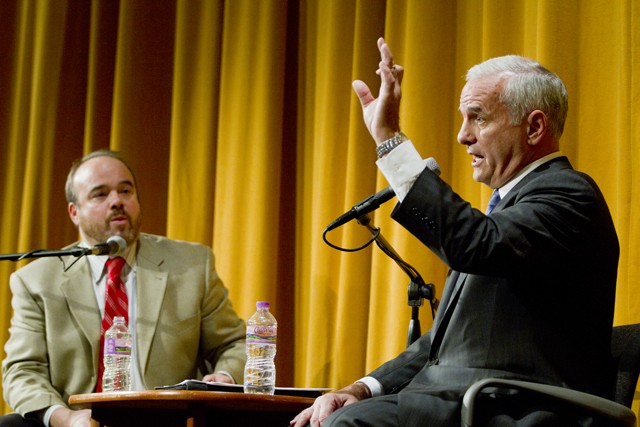Dayton opened the event by recounting former U.S. Sen. Bill Bradley’s success at reforming the federal tax code in 1986.
Like Bradley, who played basketball for the New York Knicks before becoming a congressman, Dayton hopes to overhaul a tax system. He would do so in Minnesota largely through income tax increases on the state’s wealthiest residents.
“I’m afraid if it comes down to basketball, my chances of persuading anybody are going to be fairly limited,” Dayton said. “I’m going to have to use the powers of intellectual persuasion.”
Dayton followed with a car metaphor, calling taxes the “lubricant” of democracy. Taxes allow the government to function for its citizens, he said.
For instance, higher tax rates in the 1950s allowed the federal government to complete massive projects like the national highway system, Dayton said.
Under Dayton’s plan, an additional property tax bracket would be added for million-dollar homes, income taxes on individuals earning more than $130,000 would be increased, and certain tax loopholes would be closed.
Larry Jacobs, who moderated the event, was impressed with Dayton’s specificity.
“It was as detailed a discussion of tax policy as I’ve ever seen,” said Jacobs, director of the Center for the Study of Politics and Governance. “Sen. Dayton engaged in an almost academic seminar on tax policy.”
But Dayton remained vague when asked about the consequences tax increases could have on the state’s business climate, Jacobs said.
Dayton also used the forum to highlight the University of Minnesota’s role in the state’s economy, as well as the troubling decline in state aid.
“It’s wrong for my generation to tell those of you who are students that you should get as much education as you possibly can … but we’re not going to help you pay for it,” Dayton said.
He also discussed the University’s role as a player in the biotechnology industry currently blooming in Minnesota.
Jacobs noted that Dayton discussed investments in a broad variety of sectors within the University, including the medical and law schools.
Although Jacobs billed the forum as an opportunity for a candidate to discuss specific policy proposals, rising above the “mud fight” that is a political debate, Dayton managed to take a few shots at his opponents.
He consistently criticized both opponents for lacking specific budget proposals.
The next forum, featuring Republican candidate Tom Emmer, will be held at 1 p.m. Wednesday in the Humphrey Institute’s Cowles Auditorium. Independence Party candidate Tom Horner will speak at noon Monday, Sept. 20.








